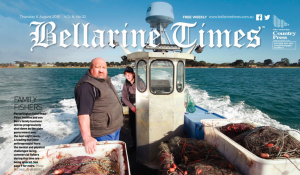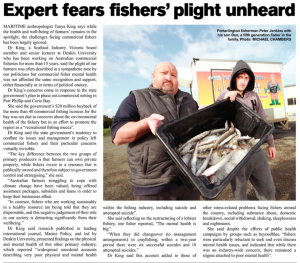
Portarlington fisherman Peter Jenkins and son Ben’s family business will be progressively shut down by the state government over the next eight years. A leading maritime anthropologist fears the mental and physical challenges facing commercial fishers during this time are being ignored. See page 9 for more.
Maritime anthropologist, Tanya King says while the health and well-being of farmers’ remains in the spotlight, the challenges facing commercial fishers has been largely ignored.
Dr King, a Seafood Industry Victoria board member and senior lecturer at Deakin University who has been working on Australian commercial fisheries for more that 15 years, said the plight of our farmers was often des cribed in a sympathetic tone by our politicians but commercial fisher mental health was not afforded the same recognition and support, either financially or in terms of political oratory.
cribed in a sympathetic tone by our politicians but commercial fisher mental health was not afforded the same recognition and support, either financially or in terms of political oratory.
Dr King’s concerns come in response to the state government’s plan to phase out commercial netting in Port Phillip and Corio Bay.
She said the government’s $20 million buyback of the more than 40 commercial fishing licences for the bay was not due to concerns about the environmental health of the fishery but in an effort to promote the region as a “recreational fishing mecca”.
Dr King said the state government’s tendency to conflate its issues and management in policy left commercial fisher and their particular concerns virtually invisible.
“The key difference between the two groups of primary producers is that farmers can own private property, while fishers invest in a resource that is publically owned and therefore subject to government control and strategizing,” she said.
“Australian farmers struggling to cope with climate change have been valued, being offered assistance packages, subsidies and loans in order to keep their businesses afloat.
“In contrast, fishers who are working sustainably in a healthy resource are being told that they are dispensable, and this negative judgement of their role in our society is detracting significantly from their wellbeing.”
Dr King said research published in leading international journal, Marine Policy, and led by Deakin University, presented findings on the physical and mental health of this other primary industry, which reported “widespread anecdotal accounts describing very poor physical and mental health within the fishing industry, including suicide and attempted suicide”.
She said reflecting on the restricting of a lobster fishery, one fisher reported, “The mental health is big”.
“When they did changeover (to management arrangements) in crayfishing, within a two-year period there were six successful suicides and 18 attempted suicides.”
Dr King said this account add
ed to those of other stress-related problems facing fishers around the country, including substance abuse, domestic breakdown, social withdrawal, shaking, sleeplessness and nightmares.
She said despite the efforts of public health campaigns by groups such as beyondblue, “fishers were particularly reluctant to seek and even discuss mental health issues, and indicated that while there was an industry-wide concern, there remained a stigma attached to poor mental health”
